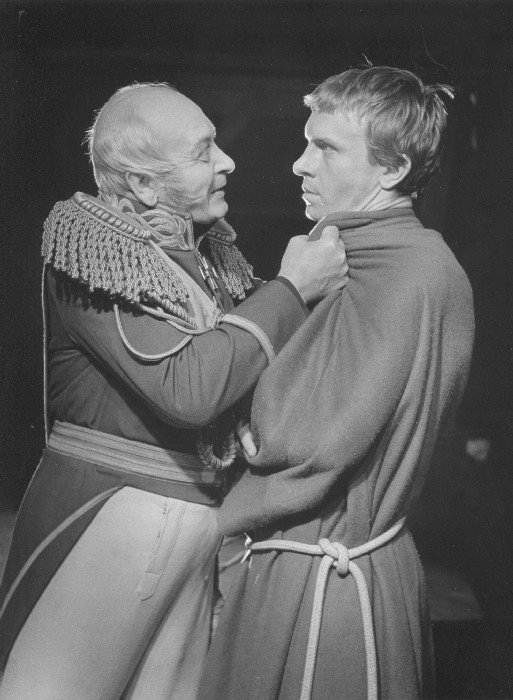He explained, “As a materialist I shifted the Christianism and mysticism of the author from the religious sphere to the realm of folk rituals, emphasizing the revolutionary and patriotic character of the work.”
The premiere, which took place after the anniversary of the revolution’s outbreak (25 November 1967), did not please the PZPR Central Committee, thus causing the publication of positive reviews to be forbidden. Rumours surrounding the play quickly began to circulate, which in turn, heightened interest in the performance. It was said, for example, that the Soviet ambassador, Awierkij Aristow, had demanded the production to be closed down. Today we know that, to the contrary, a performance in Moscow was being considered and positive reviews had appeared in the newspaper ‘Pravda’.
In the case of ‘Dziady’ we are dealing with a classic feedback loop. The rumours circulating about the reluctance of the authorities towards the performance (authenticated, among other things, by the cancellation of two performances due to Gustav Holoubek's illness), caused an increase of interest in the production, and a lively reaction of the audience to the patriotic and anti-Russian fragments of the play. The response of enthusiastic applause, in turn caused the performance to be acknowledged as ‘ant-Soviet’ and thereby influenced the mid-January decision to suspend the staging of the play. It is worth noting, however, that at the time, the reappearance of the performance after a certain intermission and cooling off period, was considered a possibility.
After the last performance on 30 January 1968, events led to a manifestation; students went to Mickiewicz’s statue and laid flowers, shouting such rallying cries as “independence without censorship”. Thirty-five people were arrested, and some were charged by the police court, which imposed fines on them. The “Commandos” along with students from the National Theatre School had planned the protest in advance.. Over the following days students in Warsaw and Wroclaw gathered several thousand signatures to protest against the removal of ‘Dziady’ from the theatre.
The outrage of cultural luminaries, caused by the Party’s decision, found its culmination in an extraordinarily stormy meeting of the Warsaw branch of the Polish Literary Association. Things came to a head on 29 February. (It is worth remembering, that most of the major writers of the time were part of the Warsaw branch.) The temperature of the discussion can be gauged by the famous words of Stefan Kisielewski, who addressed the phrase, ‘the dictatorship of the dimwits’, to the authorities (for which he was brutally beaten in retaliation a few days later.) Finally a resolution was adopted that protested against the Party’s cultural policies. The writers’ meeting became a pretext for unleashing a brutal anti-intelligentsia campaign and many people were banned from publishing.
It is interesting to note that in May and June 1968, ‘Dziady’ was performed three more times. This time the audience was specially selected – they were delegates from the most influential workplaces as well as Party authorities. .
Łukasz Kamiński
The excerpts contained here are from the National Theatre collection and were made available thanks to the kindness of the direction.
Adam Mickiewicz’s “Dziady” directed by Kazimierz Dejmek, National Theatre, premiere 25 November 1967 (photography: F. Myszkowski)
The material presented was made available thanks to the Z. Raszewski Theatrical Institute as well as Dr. Daniel Przastek, in association with the exhibition curated/prepared by the Theatrical Institute and IPN, dedicated to A. Mickiewicz’s “Dziady” as produced by K. Dejmek.
Appendix: the Zbigniew Raszewski Theatrical Institute in Warsaw in cooperation with the Institute of National Remembrance curated the “Dziady” exhibition.
